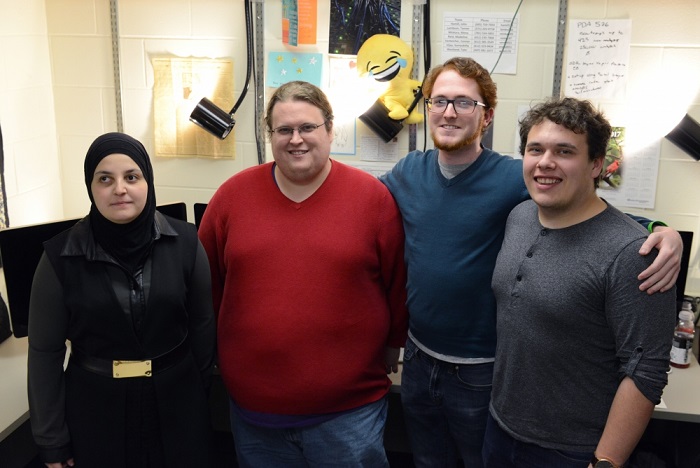MINNESOTA – Getting help in her studies from a team of volunteers and assistants, Mona Minkara, a legally blind post-doctoral research fellow in the University of Minnesota, is seeking to pay back to the world, working to create a STEM curriculum for blind children in developing countries.
“We would love for them to consider the option or possibility that maybe one day they could become scientists,” she said of blind children, Minnesota Daily reported.
Minkara graduated from Wellesley College in 2009 with a dual degree in chemistry and Middle Eastern studies.
With the help of almost 20 volunteers, she received her Ph.D. from the University of Florida, after which she took a research position at the University of Minnesota a year and a half ago.
To pay back, she is creating the curriculum with the help of her assistants, who aide her in her computational chemistry research.

Mona Minkara poses for a portrait in Kolthoff Hall with her team on Tuesday, March 20, 2017. Minkara is the University’s first blind, female, computational chemist.
Minkara said most blind-accessible curricula are expensive and her team wanted to create a way to translate visual science experiments into something blind students can understand.
“What can we do to open up — no pun intended — these kids’ eyes to science?” she said. “It was an interesting process.”
Minkara said she wants the STEM curriculum to be blind-accessible and low-cost. It will be implemented at a camp in Lebanon that has programs for both blind and sighted children which was started by her sister in 2009.
“The real challenge was getting it to be less visual than it usually is,” Connor Venteicher, a recent chemistry graduate, works as Minkara’s full-time access assistant, said.
Venteicher is also helping develop the curriculum, and said he looked to elementary school science projects to create activities for the camp, called Empowerment Through Integrity
He added that he and other assistants put on blindfolds and tried to build a volcano out of clay, baking soda and vinegar to see how classic science projects could be adapted for blind children.
“I was able to feel the warmth of it when it was heating up and … felt the foam coming out the top,” he said.
Robert Hembree, a post-doctoral researcher in the computational chemistry lab, said the biggest challenge was turning visual science into something blind children can understand.
“Everything about the way people approach it is visual,” he said. “You have to translate that into … sounds, feelings, tastes, smells.”
For Minkara, the biggest challenge to visually impaired children is to overcome their conditions and achieve their dreams.
“I think the biggest obstacle would be to be on the receiving end of pity,” she said of her blindness. “It inhibits learning. It inhibits believing in yourself.”
“Even though I’m blind, I’m a very visual learner,” she said. “Yeah, ironic, I know.”
